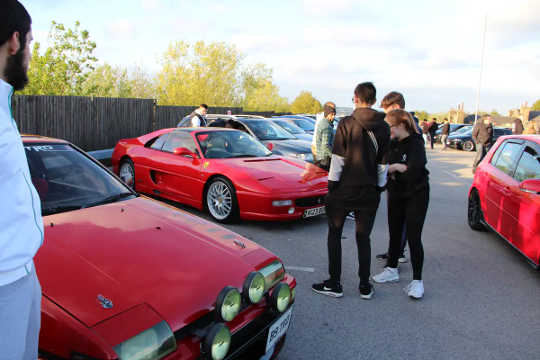Picture this for a moment, you’re in the car, tootling along, minding your own business – keeping a safe distance between you and the vehicle in front. All of a sudden some maniac in a loud vehicle comes along and neatly zips in front of you: “Bastard. Ignorant, selfish, bad mannered bastard”.
Your outburst may well be more sophisticated, but the point is, some behaviours can offend. Ordinarily, such encounters are part and parcel of the driving experience. But my research shows that something else sometimes occurs if the offending driver happens to not be white. Bastard can then mutate into “Paki”, “black” or “foreign bastard”.
As the recent wave of Black Lives Matter protests have shown, racial bias, prejudice and discrimination very much still exists, but has, in some cases, become more subtle and complex in formation over the past few decades. But, as the research for my new book shows, one space where racism is routinely present is on the road – specifically when it comes to the type of car a person may be driving.
Driver stereotypes
You might even be familiar with some of the simplistic stereotypes about various types of cars and drivers: from the White Van Man to the Subaru Boy Racer, narratives are created and circulated.
There are stereotypes about certain brands: Audi drivers as aggressive, some convertible models are either “womens’ cars” or said to be “hairdressers” cars – read that as sporty looking on a budget. And of course, the ubiquitous “Chelsea tractor” sobriquet is often used to describe any large four-wheel-drive vehicle in urban areas.
Over time and through repetition these stereotypes become highly meaningful and form shortcuts – underpinned with logic and experience, each reinforcing the other. Such ideas end up seeming normal, accepted and constitute conventional wisdom.
Racism on the road
In my sociology research, I’ve found that racial stereotypes are fairly common on the UK’s roads – particularly in multi-ethnic areas.
Over a period of several years, I spoke with people from various ethnic, gender, class and professional backgrounds. Through interview, observation and participation, the emerging data often painted car ownership as a complex but important indicator of status or success. But, at the same time, for many people, owning what appeared to be expensive cars also posed risks for the driver.
My research shows that narratives around particular types of cars in the hands of particular types of owners were abundant and held as common shorthand.
 Bradford Modified Club car meet, Bradford, May 2017. Author provided
Bradford Modified Club car meet, Bradford, May 2017. Author provided
I found, for example, that if you’re young and of South Asian heritage and you drive an expensive looking car in an inner city, then you run the risk of being stereotyped as a drug dealer. How else, after all, could someone who is not expected to have the life chances to succeed using legitimate endeavour, demonstrate such success?
Similarly, people with cars that happen to be equipped with loud in-car entertainment systems, may be seen as unruly, self-indulgent and possibly antisocial.
Changing lanes
In my new book Race, Taste, Class and Cars I look at the complexity of car acquisition, ownership and maintenance. Part of my book is dedicated to car modification – and looks at the experiences of owners who tweak their car’s performance, or aesthetics to improve its overall style, in turn adding a layer of creativity.
 Bradford Modified Club car meet, Bradford, September, 2019. Author provided
Bradford Modified Club car meet, Bradford, September, 2019. Author provided
But I’ve found that instead of seeing car customisation and modification as a creative, artistic endeavour, those who invest emotionally and economically into the look, feel and sound of their cars are often made to feel they are problematic troublemakers – and doubly problematic if they are not white.
At the heart of my analysis is the fact that race and class-based prejudices are given licence to be enacted on the road with such frequency that they become rational, banal, accepted and – as things stand – unlikely to be challenged.
And this can have wide implications. Just look at the recent experience of Labour MP Dawn Butler who has accused the Metropolitan Police of racial profiling after the BMW in which she was travelling (driven by a black male drive) was pulled over in Hackney, east London:
“There was no flipping of the camera.”
— SkyNews (@SkyNews) August 10, 2020
@DawnButlerBrent says she was “shocked” by some of the “conspiracy theories” about her video, showing her and a friend being stopped by police .
#KayBurley
Get more here: https://t.co/a1WOuuCMa0 pic.twitter.com/4oP6LqA7HV
Then there was also the recent case of team GB sprinter, Bianca Williams and her partner Ricardo dos Santos, the Portuguese 400m runner, who were stopped when they were driving through Maida Vale in west London. They were both dragged from their vehicle and handcuffed – Williams has since accused the police of racial profiling.
Indeed, a prestige car with tinted windows and black occupants in a largely white and affluent district may have been something of a flag – hence the stop.
There are many similar cases, some of which have lasting effects on those suspected by police officers as criminal, partly because of the false assumption that the car they drive seems only attainable through illicit means.
It is clear that what is needed is a shift in cultural attitudes as well as an acknowledgement of these now racially primed shortcuts for what they are. In turn, policing strategy especially within multi-ethnic areas needs modification to ensure practices aren’t just a result of stereotypical prejudice.![]()
About The Author
Yunis Alam, Lecturer in Sociology, University of Bradford
This article is republished from The Conversation under a Creative Commons license. Read the original article.

Related Books:
Atomic Habits: An Easy & Proven Way to Build Good Habits & Break Bad Ones
by James Clear
Atomic Habits provides practical advice for developing good habits and breaking bad ones, based on scientific research on behavior change.
Click for more info or to order
The Four Tendencies: The Indispensable Personality Profiles That Reveal How to Make Your Life Better (and Other People's Lives Better, Too)
by Gretchen Rubin
The Four Tendencies identifies four personality types and explains how understanding your own tendencies can help you improve your relationships, work habits, and overall happiness.
Click for more info or to order
Think Again: The Power of Knowing What You Don't Know
by Adam Grant
Think Again explores how people can change their minds and attitudes, and offers strategies for improving critical thinking and decision making.
Click for more info or to order
The Body Keeps the Score: Brain, Mind, and Body in the Healing of Trauma
by Bessel van der Kolk
The Body Keeps the Score discusses the connection between trauma and physical health, and offers insights into how trauma can be treated and healed.
Click for more info or to order
The Psychology of Money: Timeless lessons on wealth, greed, and happiness
by Morgan Housel
The Psychology of Money examines the ways in which our attitudes and behaviors around money can shape our financial success and overall well-being.
























